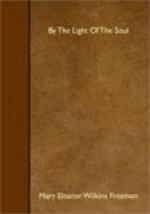“I would give full as much for Henry’s chances as for some who go to meeting every Sunday of their lives,” said Eunice, with still more spirit. “And as for trials, they weigh heavier on some than on others.”
Then young Maria, who had been listening uneasily, broke in. She felt herself a strong partisan of her Aunt Eunice, for she adored her uncle, but she merely said that she thought Uncle Henry did look a little thin, and she supposed he was tired Sunday, and it was the only day he had to rest; then she abruptly changed the whole subject by wondering if the Ramseys across the river would let Jessy go to church if she trimmed a hat for her with some red velvet and a feather which she had in her possession.
“No, they wouldn’t!” replied her aunt Maria, sharply, at once diverted. “I can tell you just exactly what they would do, if you were to trim up a hat with that red velvet and that feather and give it to that young one. Her good-for-nothing mother would have it on her own head in no time, and go flaunting out in it with that man that boards there.”
Nothing could excel the acrimonious accent with which Aunt Maria weighed down the “man who boards there,” and the acrimony was heightened by the hoarseness of her voice. Her cold was still far from well, but Aunt Maria stayed at home from church for nothing short of pneumonia.
The church was about half a mile distant. The meeting was held in a little chapel built out like an architectural excrescence at the side of the great, oblong, wooden structure, with its piercing steeple. The chapel windows blazed with light. People were flocking in. As they entered, a young lady began to play on an out-of-tune piano, which Judge Josiah Saunders had presented to the church. She played a Moody-and-Sankey hymn as a sort of prologue, although nobody sang it. It was a curious custom which prevailed in the Amity church. A Moody-and-Sankey hymn was always played in evening meetings instead of the morning voluntary on the great organ.
Maria and her two aunts moved forward and seated themselves. Maria looked absently at the smooth expanse of hair which showed below the hat of the girl who was playing. The air was played very slowly, otherwise the little audience might have danced a jig to it. Maria thought of the meetings which she used to attend in Edgham, and how she used to listen to the plaint of the whippoorwill on the river-bank while the little organ gave out its rich, husky drone. This, somehow, did not seem so religious to her. She remembered how she had used to be conscious of Wollaston Lee’s presence, and how she had hoped he would walk home with her, and she reflected with what shame and vague terror she now held him constantly in mind. Then she thought of George Ramsey, and directly, without seeing him, she became aware that he was seated on her right and was furtively glancing at her. A wild despair seized her at the thought that he might




